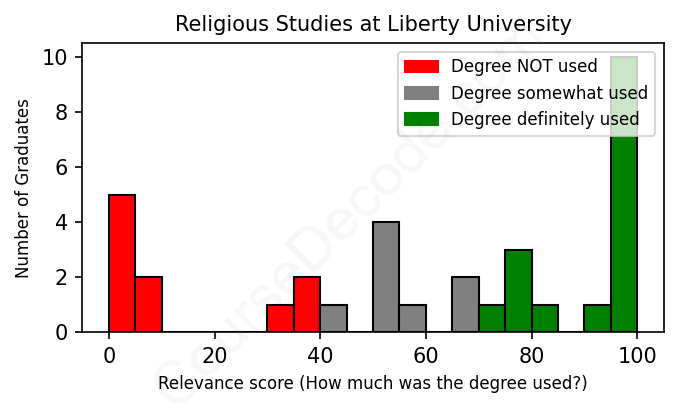
First, some facts. Of the Religious Studies graduates from Liberty University we've analyzed , here's how many have used (or NOT used) their degree in their career:

These are estimates based on AI analysis of 34 LinkedIn profiles (see below).
The verdict? Below average. Overall, with an average relevance score of 59%, Religious Studies graduates from Liberty University have a lower likelihood (-8%) of finding work in this field compared to the average graduate across all fields:
And for comparison, here's the chart for all profiles we've looked at across all degrees.
Also, after graduating, 64% of these graduates have pursued further education other than another Bachelor's degree (such as a Masters degree or other), compared to the average across all profiles of 35%. This suggests you may need more than just a Bachelors degree to be competitive as a Religious Studies graduate.
See the details:
|
Relevance score: 78% We think this person has gone into a career highly relevant to their degree. We think this person has gone into a career highly relevant to their degree.
DEGREE INFOGraduated in 2011 from Liberty University with a Bachelors Degree in Religious Studies. No other secondary education since. JOB HISTORY SINCE GRADUATIONBiblical Counselor Association of Certified Biblical Counselors (ACBC) Aug 2012 - Present Owner  GEO (Gateway Essential Oils) Jul 2015 - Present ABOUTI am a compassionate solutions-oriented Biblical Counselor who uses the Bible to address the issues in the lives of individuals and families in Wentzville and surrounding area as well as counseling via Skype. The Bible teaches that thoughts, motives, attitudes, words, and actions flow from the condition of the heart. Biblical Counseling is directed to changing a persons heart which, in effect, will change their behavior. The Bible gives us the content, methods, and qualifications in order to counsel. It does not require a degree, but a desire to study and know the Word and be sound in theological issues.Education2011 | Bachelor of Science: Religion Liberty UniversitySumma Cum LaudeCertificationOctober 2012 - | Association of Certified Biblical Counselors http://www.biblicalcounseling.com/REQUIREMENTS FOR CERTIFICATIONSeptember-November 2008 - Counseling and Discipleship Training Fundamentals of Biblical Counseling 30 hoursSeptember-November 2009 - Counseling and Discipleship Training Advanced Track: Going Deeper 30 HoursRequired reading; Counseling observation; Counseling and Theological Examinations; 50 practicum hours under the supervision of a Association of Certified Biblical Counselors FellowADDITIONAL TRAININGSeptember 2009 November 2010 Gateway Biblical Counseling and Training Center Fairview Heights, Illinois80 hoursSkillsCertified Biblical CounselorDedicated and DependableSelf-directedExperience with indigent populationExperience with developmental disabilitiesSkilled at intake interviewing |
The top 10 most common jobs done by the graduates we've analyzed (ranked most common to least) are:
When looking at the jobs that graduates with a degree in Religious Studies from Liberty University have taken on, there’s a clear trend that emerges. Many of them gravitate towards positions like pastors, chaplains, and other roles rooted in spiritual leadership and community engagement. These jobs heavily utilize the knowledge and skills taught in Religious Studies, such as theology, ethics, and pastoral care. For instance, roles like Senior Pastor or Hospice Chaplain directly apply what they learned in their degree, allowing them to guide and support others in their spiritual journeys.
On the flip side, there's a noticeable number of graduates who have pursued careers that don't strongly relate to their degree. Jobs in customer service, sales, IT support, or logistics often appear in their profiles, which suggests that not all graduates find paths directly tied to their education. While some of these roles may draw on general skills like communication or ethical understanding that could be lightly influenced by their studies, they typically don't require the deeper, critical insights associated with a Religious Studies background. Overall, while many are following vocations that align closely with their studies, a substantial number have veered into unrelated career fields, highlighting a broad spectrum of job possibilities for these graduates.
Here is a visual representation of the most common words in job titles for Religious Studies graduates (this is across all Religious Studies graduates we've analyzed, not just those who went to Liberty University):

Looking at the career paths of graduates from Liberty University with a degree in Religious Studies, it seems they often find themselves in various roles that relate back to the field, especially in ministry and counseling. Right after graduation, many of these individuals tend to land jobs as pastors, chaplains, or in roles within religious organizations, which shows that they are taking their education directly into meaningful service positions. For example, several graduates from 2010 and 2011 started as chaplains or in pastoral roles soon after finishing their studies, illustrating a strong connection to their degree.
As we fast-forward five or ten years, the trend mostly continues. Many stay in ministry-related roles, like senior pastors or directors in church organizations. Others branch out and apply their skills in related fields, such as health education or community outreach. There’s also a notable number who pivot toward education or administrative roles in churches or religiously affiliated organizations, which shows versatility in the job market. However, it’s clear that some graduates do end up in less-related jobs as the years go by. For instance, some took on roles in areas like customer service or logistics, which don’t tie back directly to their Religious Studies background. Overall, while there are plenty of success stories in ministry, some graduates take varied paths, leading to a mix of outcomes—both aligned and not aligned with their original degree focus.
Honestly, a Bachelor’s degree in Religious Studies at Liberty University isn’t generally considered super tough, especially compared to some other majors. You’ll be diving into a mix of theology, philosophy, and cultural studies, which can be interesting but also pretty manageable if you’re into the subject. While there might be some challenging readings and assignments, most students find the courses to be engaging rather than overwhelming. Plus, Liberty has a supportive environment, so you’ll likely have resources and professors ready to help you out if you hit any bumps along the way. Overall, it leans towards the easier side of the degree spectrum, especially if you have a passion for the topic!
Most commonly, in the LinkedIn profiles we've looked at, it takes people 2 years to finish a Bachelor degree in Religious Studies.
Looking at the job history of these Liberty University Religious Studies grads, it seems like their salaries are all over the place. Some, like the hospice chaplain and senior pastors, probably make a decent living, especially if they have stable positions in established churches. But then you've got others in roles like IT support or sales, which might not pay as well. The military chaplains might be on the higher end due to their military benefits, but as a whole, many of these jobs are in fields like education, counseling, and ministry, which often don’t offer the highest salaries unless you're at a larger organization or have been in the game for a while. So overall, while some may have decent earnings, many might be working for less than what you’d expect from a college degree, especially if their focus is more on service than on financial gain.
Here is a visual representation of the most common words seen in the "about" section of LinkedIn profiles who have a Bachelor degree in Religious Studies (this is across all Religious Studies graduates we've analyzed, not just those who went to Liberty University). This may or may not be useful:

Here are all colleges offering a Bachelor degree in Religious Studies (ordered by the average relevance score of their Religious Studies graduates, best to worst) where we have analyzed at least 10 of their graduates:
| College | Score | Count |
|---|---|---|
 Liberty University Liberty University
|
59 | 34 |